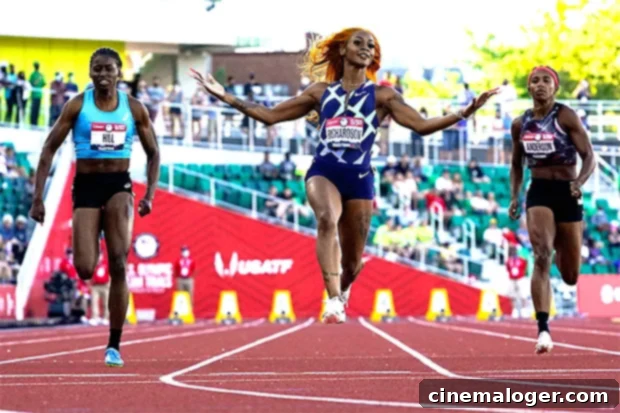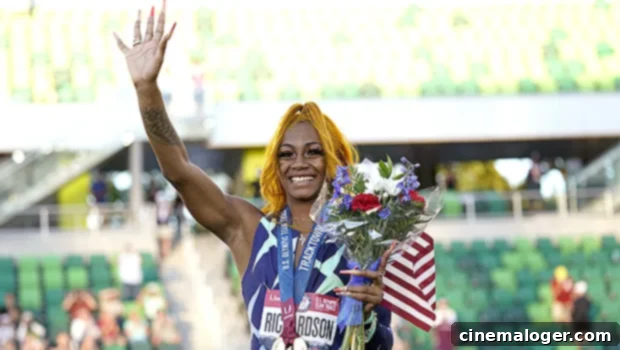Celebrities Rally for Sha’Carri Richardson: An Olympic Dream Derailed by Cannabis Policy
The world watched in disbelief as Sha’Carri Richardson, the electrifying U.S. track and field star, was suspended from the Olympic Trials after testing positive for THC, the main psychoactive compound in cannabis. This shocking news, which emerged just weeks before the highly anticipated 2020 Tokyo Olympics, ignited a firestorm of debate across social media and news platforms. Richardson, who had just dominated the 100m dash at the trials, faced a one-month ban from the United States Anti-Doping Agency (USADA), effectively jeopardizing her chances to compete in her signature event on the global stage. Her candid admission that she used marijuana to cope with the recent loss of her biological mother only intensified public sympathy and spurred a widespread outpouring of support from fans, politicians, and a multitude of celebrities who felt the punishment was disproportionate and unjust.
Among the first and most vocal supporters was renowned actress Gabrielle Union, who swiftly took to social media to advocate for Sha’Carri. The 21-year-old athlete’s suspension quickly became a lightning rod for discussions surrounding mental health, outdated anti-doping regulations, and systemic inequities. Despite her stellar performance and securing first place in the 100m at the Olympic Trials, the USADA’s decision, confirmed by The New York Times, meant a painful setback. Sha’Carri herself addressed the situation with remarkable grace and honesty, offering a heartfelt apology in a TODAY interview. She also shared a poignant, self-reflective message on Twitter, simply stating, “I am human,” a sentiment that resonated deeply with many who empathized with her vulnerability and the immense pressure athletes face. This simple yet powerful statement encapsulated the human element often overlooked in the rigid world of professional sports, highlighting her personal struggle behind the public spotlight.

Gabrielle Union was at the forefront of the star-studded defense for Sha’Carri, who bravely explained that she had used cannabis to cope with the profound grief following the death of her biological mother. Union’s response was both humorous and cutting, quipping, “Weed is great for many a thing but running faster isn’t one of them.” This pointed remark cleverly dismantled the notion that marijuana offers any performance-enhancing benefits in sprinting, highlighting the absurdity of the ban in this context. More significantly, she rallied behind the athlete with the resounding call, “Let her run,” a phrase that rapidly evolved into a powerful rallying cry across social media platforms, uniting supporters in their demand for justice. This simple yet potent slogan captured the collective sentiment that Sha’Carri’s talent and hard work should not be overshadowed by an arguably outdated rule. The sentiment quickly gained traction, with other public figures echoing the call. Bachelor star Jade Roper Tolbert and E! host Morgan Stewart both amplified the message, commenting “Let her run” on an E! News Instagram post discussing Sha’Carri’s situation, showcasing the broad appeal of the movement. This wave of celebrity support not only brought mainstream attention to the issue but also underscored the perceived unfairness of the ruling, transforming the athlete’s personal setback into a broader conversation about fairness and compassion in sports.
Weed is great for many a thing but running faster isn’t one of them. LET HER RUN!!! #ShacarriRichardson
— Gabrielle Union (@itsgabrielleu) July 2, 2021
The Outcry Spreads: Athletes and Entertainers Join In
The chorus of support for Sha’Carri Richardson wasn’t limited to a few voices; it quickly expanded, drawing in a diverse array of celebrities from the worlds of sports, entertainment, and pop culture. Each voice added a unique perspective to the burgeoning conversation about fairness and the perceived injustice of the suspension. NFL star Odell Beckham Jr. expressed his strong disapproval, calling the suspension “bulls**t” in a direct response to Sha’Carri’s initial tweet acknowledging the scandal. His blunt language reflected the raw frustration felt by many who saw the ruling as an unnecessary and punitive measure against a talented athlete. The sentiment was clear: the penalty seemed to outweigh the offense, especially given that cannabis is not generally considered a performance-enhancing drug in the context of sprinting.
Veteran actor George Takei, known for his role in Star Trek and his sharp wit, offered a particularly clever and memorable critique of the ban. He humorously highlighted the perceived absurdity of the situation by tweeting, “They once found trace amounts of THC in my blood, and they still let me pilot the Enterprise.” This iconic reference to his legendary character, Captain Hikaru Sulu, powerfully underscored the idea that if a fictional space captain could operate a starship with THC in his system, a runner should certainly be allowed to compete in a footrace. His tweet effectively ridiculed the severity of the punishment, implying that the rules were draconian and out of touch with modern understanding. Adding to the call for progressive change, Real Housewives of Salt Lake City star Heather Gay unequivocally tweeted for society to “normalize weed” and advocated strongly that Sha’Carri should be permitted to compete. Her straightforward appeal resonated with many who believe that cannabis use, particularly for personal coping mechanisms, should not be a disqualifying factor for athletes, especially as cannabis laws evolve across various states and countries.
This is bull Shxt……tbh
— Odell Beckham Jr (@obj) July 2, 2021
Look, they once found trace amounts of THC in my blood and they still let me pilot the Enterprise.
— George Takei (@GeorgeTakei) July 2, 2021
Normalize weed. Let @itskerrii compete! 🏃🏽♀️ 😭
— Heather Gay (@heathergay29) July 2, 2021
Beyond Support: Addressing Deeper Issues of Racism and Policy
Beyond the initial waves of sympathy and calls for leniency, the controversy surrounding Sha’Carri Richardson’s suspension ignited a crucial national conversation about marijuana laws and their historical context, particularly in relation to race. Actor and well-known cannabis enthusiast Seth Rogen articulated this critical point with exceptional clarity and force. He took to Twitter to directly address the systemic issues at play, writing, “The notion that weed is a problematic ‘drug’ is rooted in racism. It’s insane that Team USA would disqualify one of this country’s most talented athletes over thinking that’s rooted in hatred. It’s something they should be ashamed of.” Rogen’s powerful statement underscored the argument that the prohibition of cannabis and its associated penalties have disproportionately affected marginalized communities, particularly Black individuals. He further satirized the idea that cannabis could be performance-enhancing by adding, “Also if weed made you fast, I’d be FloJo,” referencing the legendary sprinter Florence Griffith Joyner. This comment brilliantly exposed the hypocrisy and lack of scientific basis behind classifying cannabis as a performance enhancer for track athletes. Queer Eye star Jonathan Van Ness echoed this sentiment, emphasizing the devastating societal impact of cannabis prohibition. His tweet highlighted how these archaic laws have tragically “fucked up so many peoples lives,” reinforcing the plea for empathy and reform, and reiterating widespread support for Sha’Carri.
The notion that weed is a problematic “drug” is rooted in racism. It’s insane that Team USA would disqualify one of this country’s most talented athletes over thinking that’s rooted in hatred. It’s something they should be ashamed of. Also if weed made you fast, I’d be FloJo. https://t.co/swDLNoVcV3
— Seth Rogen (@Sethrogen) July 2, 2021
To punish this incredible athlete for cannabis?? This prohibition has fucked up so many peoples lives I just can’t even. We love you @itskerrii https://t.co/mzxrySbAyM
— Jonathan Van Ness (@jvn) July 2, 2021
The discussion on the racist underpinnings of cannabis prohibition was further amplified by Glee actress Amber Riley. She shared a screenshot on Instagram from an account @freewomxn, which powerfully argued that Sha’Carri’s suspension was not an isolated incident but symptomatic of a much larger, insidious problem. The screenshot specifically called out those who staunchly believed Sha’Carri deserved punishment for “breaking a rule,” exposing a deeper societal bias. Amber Riley’s accompanying caption directly confronted this bias: “Y’all really hate black women, and it shows.” Her words were a stark reminder that the challenges faced by Black women in society, and particularly in high-profile arenas like sports, are often compounded by prejudice and unfair scrutiny. She concluded with a powerful declaration of solidarity: “We publicly and LOUDLY stand with you, sis.” This statement highlighted the importance of collective support and advocacy in combating racial and gender biases within established systems, cementing Sha’Carri’s ordeal as a critical moment in the ongoing fight for social justice in sports.
The Broader Conversation: WADA Rules, Cannabis Legality, and the Call for Reform
Sha’Carri Richardson’s case brought the World Anti-Doping Agency (WADA) rules under intense scrutiny. WADA, the international body responsible for anti-doping policy, classifies cannabis as a “substance of abuse” rather than a performance-enhancing drug, placing it alongside cocaine, ecstasy, and heroin. The rationale for its inclusion on the prohibited list typically revolves around three criteria: it has the potential to enhance sport performance, it represents a health risk to the athlete, or it violates the spirit of sport. For cannabis, the argument for performance enhancement is tenuous at best for many sports, and particularly for a sprinter where slowing reaction times and impairing coordination would be detrimental. This discrepancy between the rule and its practical application fuelled much of the public’s frustration. Sha’Carri’s explanation that she used marijuana to cope with the immense emotional pain of losing her mother resonated deeply, highlighting the critical intersection of athlete welfare and rigid regulatory frameworks.
The controversy also underscored the growing disconnect between evolving legal landscapes for cannabis and the stagnant policies within international sports. In the United States, an increasing number of states have legalized cannabis for recreational or medicinal use, reflecting a significant shift in public perception and policy. However, major sports organizations and international bodies like WADA have been slower to adapt, clinging to older classifications rooted in different societal and scientific understandings. This cultural and legal lag means athletes like Richardson, competing under international rules, can face severe penalties for using a substance that might be legal in their home state and is widely accepted by many as a form of stress relief or medication. The public outcry essentially called for a modernization of anti-doping policies to align with current scientific knowledge, societal norms, and a more compassionate understanding of athlete mental health.
Ultimately, the incident sparked a global conversation demanding reform. Critics argued that punishing an athlete for using cannabis, especially when it is not proven to enhance performance and was used for personal coping, detracts from the true spirit of fair play and undermines the integrity of the sport. Many called for WADA and national anti-doping agencies to reassess their approach to substances like cannabis, advocating for a focus on actual performance enhancement and athlete well-being rather than blanket prohibitions that may be rooted in outdated moral or discriminatory biases. The hope is that Sha’Carri Richardson’s unfortunate experience will serve as a catalyst for meaningful change, leading to more equitable and understanding policies in the future.
Conclusion: A Defining Moment for Sports and Social Justice
The suspension of Sha’Carri Richardson was more than just a momentary setback for a promising athlete; it became a defining cultural moment that crystallized multiple ongoing debates about sports, mental health, racial justice, and drug policy. The overwhelming wave of support from celebrities, athletes, and the general public underscored a collective yearning for more humane and equitable systems. From Gabrielle Union’s rallying cry of “Let her run” to Seth Rogen’s incisive critique of cannabis prohibition’s racist origins, and Amber Riley’s powerful emphasis on the specific challenges faced by Black women, the responses were varied but united in their condemnation of the perceived injustice. This incident forced a critical examination of anti-doping regulations, pushing for a move away from punitive measures rooted in outdated ideologies towards policies that prioritize athlete well-being, scientific accuracy, and social equity. Sha’Carri Richardson’s story, while marked by disappointment, ultimately highlighted her resilience and transformed her into an unwilling but powerful symbol for change, sparking a necessary dialogue that will undoubtedly influence the future of sports governance and justice.
